Mithridates VI Eupator, "like Hannibal in hatred of the Romans"
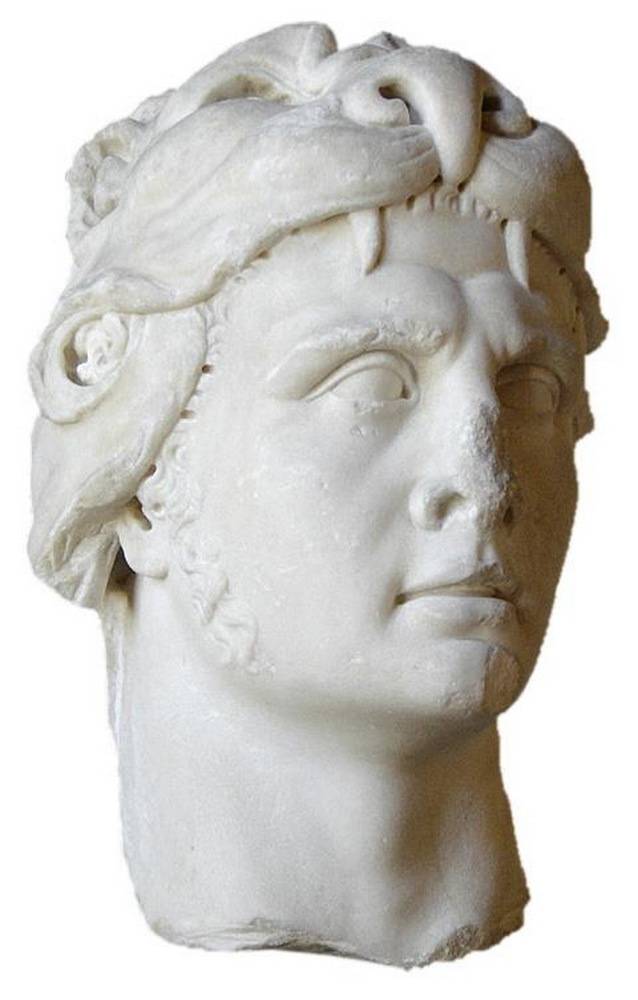
Mithridates VI Eupator, bust. Louvre
Talking about Rome, usually pay little attention to its opponents. This is understandable: history the victors wrote, and Roman authors were primarily interested in their own heroes - emperors or generals, even rebellious ones - like Sertorius. The last queen of Ptolemaic Egypt, Cleopatra, attracted attention, since the history of her life was closely connected with the names of Julius Caesar and Mark Antony. An exception was made for Pyrrhus and especially Hannibal Barcis, the generals most dangerous to Rome, who operated in Italy and threatened the very existence of the republic. It was all the more pleasant to write about them because, in the end, they were defeated, and victory over a strong and worthy enemy is always and everywhere valued very highly and dearly. Spartacus stands apart, the war with which was considered shameful, but was so difficult that it was simply impossible to ignore the mysterious leader of the rebellious slaves. But today we will still talk about one of those kings who dared to challenge Rome. It will be about the ruler of the Pontic kingdom Mithridates VI Evpator and the three so-called Mithridates wars. Gaius Velleius Paterculus wrote about this king:
Lucius Annaeus Florus noted that Hannibal resisted the Romans for thirteen years, and Mithridates for forty.
But first, you have to tell a little about the state ruled by Mithridates VI.
Pontic Kingdom
This Greek-Persian Hellenistic state was founded on the territory of Paphlagonia in 302 BC. e.
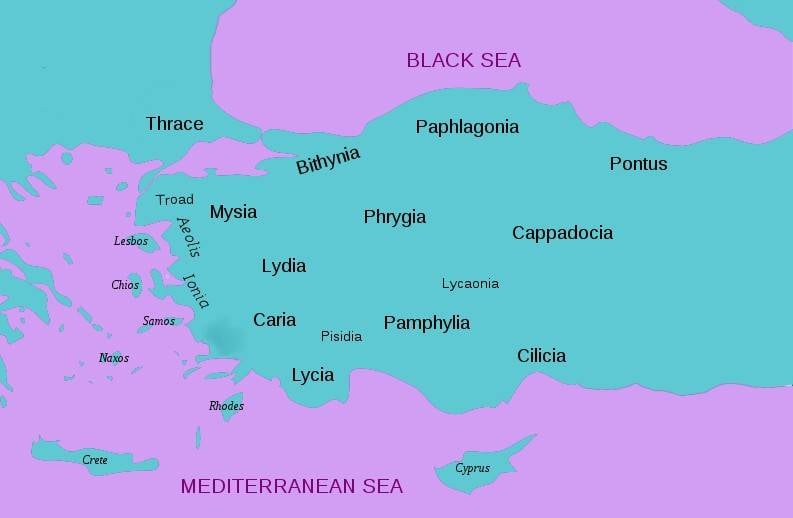
Paphlagonia on the map of Asia Minor
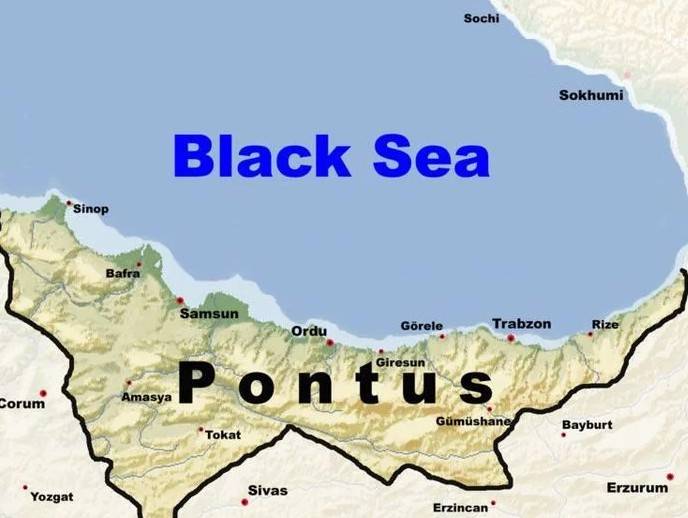
Pont on the map
The neighbors of Pontus were Macedonia and the powerful state of the Seleucids. Later, the ancient Bosporan kingdom was attached to it, which was formed around 480 BC. e.
The first ruler of Pontus was Mithridates I Ktist (Builder), a noble Persian who was in the service of the former commander of Alexander the Great, Antigonus One-Eyed. However, the diadochus was angry with him, and the reason for this anger, as they say, was a dream: Antigonus saw that he had sowed the field with gold, and the impudent Persian Mithridates, the governor of the city of Kios, located on the shores of the Sea of Marmara, the father and namesake of the founder of the Pontic kingdom, “squeezed harvest". According to Plutarch, Mithridates was on friendly terms with the son of this diadochus, Demetrius Poliorcetes, who was described in two previous articles. Upon learning of his father's arrest and execution, he wrote with a spear on the ground: "Run Mithridates».
Mithridates did not hesitate and fled, hiding in the fortress of Kimiata - on the border of Pontic Cappadocia and Paphlagonia. The same fugitives began to adjoin him, and a new state gradually began to take shape, which at first was called "Cappadocia near Pontus" or "Cappadocia near Euxinus." Its first capital was the city of Amasia (Amasya), the birthplace of Strabo. At various times, this city was also the capital of the Roman provinces of Pontus Galata and Helenopont.
In 282 BC. e. Mithridates I appropriated the title of king (basileus) to himself.
Mountains divided Pontus into two parts. The seaside area was dominated by the Greek population engaged in trade, handicrafts, olive oil production and fishing. Here were the Greek policies of Amastrida (conquered by the son of Mithridates I - Ariobarzanes) and Sinop (it was captured by Pharnaces I and became the new capital of Pontus).
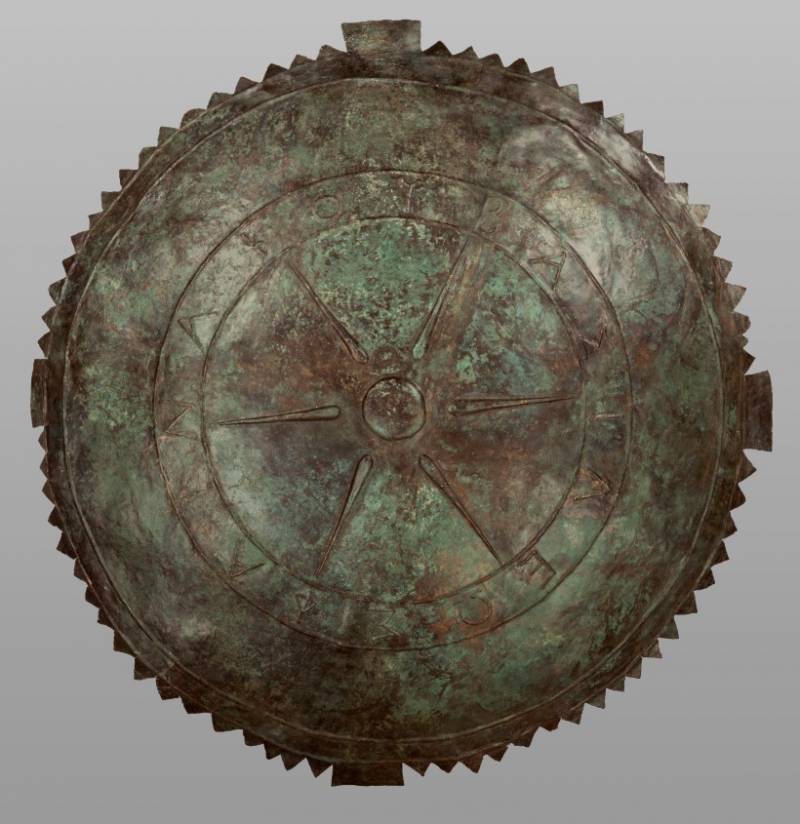
Pontic bronze shield with the name of King Pharnaces I
Representatives of local Anatolian tribes lived in the interior of Asia Minor, whose economy was based on metallurgy, silver mining and animal husbandry. Here was the first capital of the state - Amasia. Greek was the official language of the Pontic kingdom.
The kings of Pontus gradually expanded the borders of their state and entered into prestigious dynastic marriages, for example, with the Seleucids. During the reign of the father of the hero of the article, Mithridates V, the king of Pergamum, Attalus III, died childless (in 133 BC), who allegedly bequeathed his state to Rome. As a result, a new war began - after all, Attalus had a brother, Aristonicus, who had his own opinion on this matter. As a result, Pontus, who acted as an ally of Rome, received Great Phrygia, and the remnants of the Pergamon kingdom were transformed into the Roman province of Asia. And then the Pontics already arbitrarily annexed Cappadocia, Paphlagonia and Galatia, which the Romans could not stand: in 122 BC. e. the Senate issued a decree on the "alienation" of Great Phrygia. And in 120 BC. e. the widow of Mithridates V, who was rumored to have poisoned her husband, transferred all 4 regions to Rome in exchange for recognition of her rights. The Kingdom of Pontus reached its greatest power precisely during the reign of the hero of our article: he managed to capture Bithynia, Cappadocia, the Greek colonies of the Crimean Peninsula, Thrace, Macedonia, and even the Roman province of Asia. Some say that the power of Mithridates VI became the prototype of Byzantium.
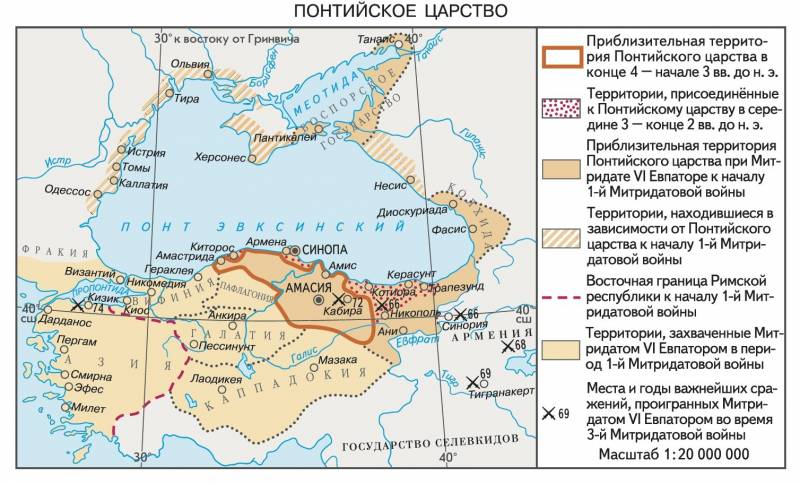
Map of the Kingdom of Pontus and the expansion of its territory
Now let's move on to the story of the life and fate of Mithridates VI.
Eupator and Dionysus
Mithridates was born around 135 BC. e. in the city of Sinop. His name can be translated from Persian as "inspired by Mithra". In addition, the hero of our article had two nicknames. The first - Evpator, meant "noble", it was quite common among the rulers of the Hellenistic states. But the second, Dionysus, he received in early childhood because lightning struck his cradle, which lit the diapers, but the baby remained alive and practically did not suffer, only a small scar on his forehead reminded of this incident. The courtiers remembered the legend that Dionysus was born to the daughter of Cadmus (the founder of Thebes) Semele after this woman persuaded her lover, Zeus, to appear to her in his true form - in the radiance of lightning.
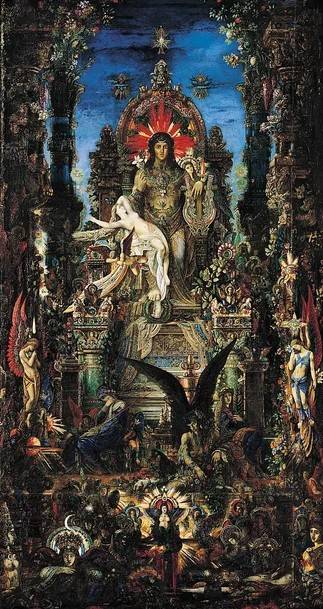
G. Moreau. Jupiter and Semele
In addition, Justin claims that during the years of the birth of Mithridates VI and his accession to the throne, bright comets were visible in the sky.
The origin of Mithridates VI was the most noble: among his ancestors on the father's side was the Persian king Darius III, and on the mother's side (Laodice VI, daughter of the Seleucid ruler Antiochus IV) was the Macedonian diadochus commander Seleucus I Nicator. Justin claims that Mithridates VI contemptuously called the rulers of Rome "crowd of vagabonds". To preserve the purity of the blood, this Pontic king married his own sister Laodike. However, he had 4 more wives and a huge number of concubines.
On the eve of the first war with Rome, Mithridates VI minted coins, where he was called the Great, Basileus and even the king of kings.
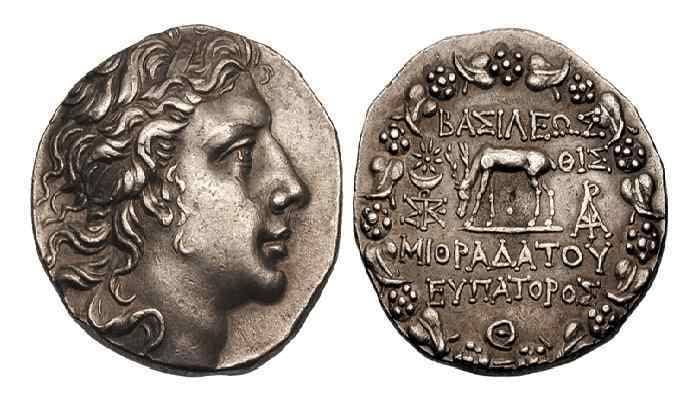
Tetradrachm of Mithridates VI
Everyone notes the outstanding physical data of this ruler. Thus, Justin writes that:
Plutarch states:
It is also reported that Mithridates VI could speak freely with each of his subjects - that is, it turns out that he knew at least 22 languages.
Since during the wars with Rome Mithridates miraculously escaped captivity three times, contemporaries compared him to a snake that, when wounded in the head, slips out of the hands, threatening with its tail.
The hero of the article lost his father early: Mithridates V Euergetes (“The Benefactor”) died in 120 BC. e., according to some sources - from poison, and his wife, Laodice, a princess from the Seleucid family, was suspected of poisoning the king. Both sons of this king at that time were minors, and therefore it was Laodice who came to power in the Pontic kingdom. Her favorite son was the youngest named Khrest, and Mithridates, who feared for his life, fled from home. Since he was between 11 and 14 years old at that time, it can be assumed that the escape was organized by an opposition court group that wanted to use the prince for their own purposes. Some authors claim that over the next 7 years Mithridates was hiding in the mountains, but it is more likely that most of this time he lived at the court of the king of Lesser Armenia Antipater, who, having no sons, fell in love with the boy so much that he bequeathed his lands to him. They say that it was then that Mithridates began to accustom his body to poisons, because of which he allegedly could not poison himself later.
Basileus Mithridates VI
In 113 BC. Mithridates triumphantly returned to Pontus and took the throne. His mother and younger brother were arrested on his orders and soon died in prison (perhaps they were killed), but they were buried with royal honors.
Mithridates VI was officially married 5 times, and his first wife, as we remember, was his sister Laodike, who gave birth to 5 children from him. One of the daughters of Mithridates, Cleopatra, in 94 BC. e. was married to the powerful Armenian king Tigran II.
Immediately after coming to power, Mithridates began to expand his possessions.
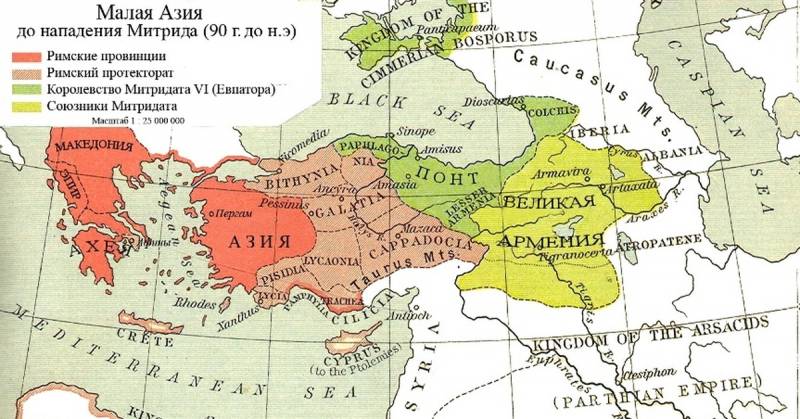
Asia Minor before the attack of Mithridates VI
Initially, the Pontic troops, led by the commander Diophantus, were sent to help Chersonese, which was threatened by the Roxolani and Scythians. According to one version, after the victory, Diophantus founded a new fortress, which was named after this king - Evpatoria. However, historians object, saying that the Greek city of Kerkinitis was already on this site. Then the Tatar city of Kezlev (from the word “spring”) was located here, after the conquest of the Crimea it was called Kozlov, but then, in 1784, it was given the Greek name Evpatoria. But in Pontus, Evpatoria was nevertheless built - at the intersection of two important roads in the Phanarea valley, which is located on the territory of the modern Turkish province of Tokat.
Let us return to the time of Mithridates VI and see that at that time the important and large cities of Olivia and Chersonese recognized the authority of this king. An agreement was also concluded on the inheritance of the Kingdom of Bosporus by Mithridates, which caused discontent among the local nobility and the rebellion of Savmak, who killed the legitimate king of the Spartokid dynasty, Perisad V. But this only accelerated the accession of Bosporus to Pontus: Savmak was defeated and captured, in 108-107. BC e. The Bosporus kingdom lost its independence, Pontic garrisons were placed in Theodosius and Panticapaeum.
In 106-105 years. BC e. Mithridates annexed part of Paphlagonia, dividing it with the Bithynian king Nicomedes, in 104-103. - Colchis, where, according to Strabo, he built 75 fortresses, as well as part of western Armenia. But the interests of Pontus came into conflict with the interests of Rome, whose armies twice acted on the side of the Bithynian king Nicomedes. Bithynia was extremely important for the Romans, since it was on its territory that the Black Sea straits were located, through which communication was carried out with the Roman province of Asia. In the end, Mithridates decided to confront Rome. The situation seemed to favor his plans. The Romans initially waged a difficult Allied war with the Italic tribes, as a result of which they were forced to grant them citizenship rights. And then, in Rome itself, the parties of optimates and populists clashed for life and death. Sulla led an army to his own capital, assembled for the war with Mithridates, and his troops entered Rome - for the first time in the history of this city. And at this time, the Roman troops of the proconsul Manius Aquilius and the governor of Asia, Lucius Cassius, allied to the Bithynian king Nicomedes, were defeated. Cassius fled to Rhodes, and Manius Aquilius was captured, the Pontics drove him tied around the cities on a donkey, and then executed him by pouring molten gold into his throat. On the other hand, in 88 BC. e. Mithridates organized a massacre of Roman citizens, the victims of which were up to 80 thousand people. Then the fighting was transferred to Greece. However, Sulla, albeit 18 months late, nevertheless came to the war with Pontus. Now Mithridates and his generals were opposed by the merciless machine of the Roman army of the last century of the republic, led by a commander who always achieved his goal and in his entire life did not suffer a single defeat.
First Mithridatic War
So, using the border conflict with Bithynia as a pretext, in 89 BC. e. Mithridates declared war on Rome. On his side were the Armenian king Tigran II (married to the daughter of Mithridates), various policies and tribes of the Balkan Peninsula and Cilician pirates, who represented a formidable force and felt like the real masters of the Mediterranean Sea. The beginning of the war turned out to be successful: Bithynia, Phrygia, Paphlagonia were captured, and the loyalty of the local population was achieved. It was announced the restoration of self-government in cities, the forgiveness of arrears, tax exemption for 5 years. The Pontic commander Archelaus captured the island of Delos and found support in Laconia and Boeotia. In Athens, a supporter of Mithridates Aristinion seized power. And only now, in 87 BC. e. Sulla's army landed in Epirus, from where it moved to Attica. Here Sulla defeated the Pontic troops of Archelaus and began the siege of Athens. They say that then, for the construction of siege engines intended for the assault on the Acropolis, the groves of Plato's Academy and Aristotle's Lyceum were cut down.
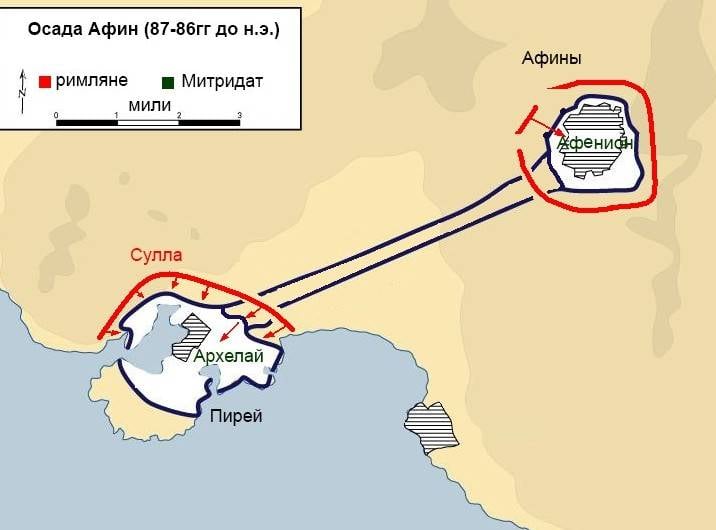
Siege of Athens 87-86 BC e.
March 1, 86 B.C. e. Athens was taken by storm and heavily devastated. To replenish the military treasury, Sulla, without hesitation, ordered the confiscation of the treasures of several Athenian temples and even the famous temple of Apollo at Delphi. Archelaus still held Piraeus, but, without waiting for help, he sailed to Thessaly. Here the remnants of his troops joined with another Pontic army, commanded by Taxilus. Their combined troops were defeated in the battle of Chaeronea, where the Macedonian king Philip, Alexander's father, once won his famous victory over the Greeks. The Pontics received reinforcements, but in 86 BC. e. in Boeotia suffered a new defeat - at Orchomenus. However, at some point, the situation on the battlefield developed in such a way that Sulla had to stop the fleeing soldiers with a banner in his hands.
Against the background of these failures in Asia Minor, the Galatians rebelled against Mithridates. And in the Aegean Sea, the Roman squadron of Lucius Licinius Lucullus was now operating, which we will talk about later. The Pontic fleet was defeated in a naval battle at Tenedos, after which Sulla's army crossed into Asia Minor. Mithridates entered into peace negotiations. At another time, Sulla would probably have preferred to finish off the king of Pontus, but in Rome the populace came to power and outlawed him. Therefore, Sulla in 85 BC. e. went to the signing of the Dardanian peace treaty, according to the terms of which the Pontics withdrew troops from the territories they occupied, gave the Romans 80 warships and agreed to pay three thousand talents of gold (about 75 tons). Sulla was proclaimed emperor by the soldiers and went to Italy. Ahead was a new civil war and the first proscriptions in the history of Rome.
Second Mithridatic War
The Dardanian world did not suit either Mithridates or the Romans, but was used by them to solve their problems. Mithridates brought into obedience the fallen Bosporans and Colchians. He even had to execute his son Mithridates, who, being sent to the Bosporus as a governor, began to pursue a separatist policy. In his place, another son of the Pontic king, Mahar, was sent, who also did not justify his father's hopes. And Sulla fought with the Marians and "put things in order" in Italy, he did not need a war in Asia Minor. However, the legate of Sulla, Lucius Licinius Murena, who remained in the east with two legions, dreamed of the glory of the great commander. Taking advantage of the military preparations of Mithridates VI directed against the Bosporus and Colchis, he accused him of aggressive intentions towards Rome and its allies - and delivered a "preemptive strike." In 83 BC. e. he arbitrarily attacked Pontus and was defeated near the river Halys. After this, several minor battles took place, which did not give an advantage to either side. Finally, having defeated his rivals in Italy, Sulla ordered Murena to stop hostilities. The winner was Mithridates, who occupied part of Cappadocia through a dynastic marriage. So in 81 BC. e. and ended the Second Mithridatic War. However, the ambassadors of Mithridates who went to Rome arrived there after the death of Sulla, who, although he retired, continued to exert a serious influence on the policy of the Republic. It was Sulla who ordered Murena to stop hostilities and was determined to sign a full-fledged peace treaty with Pontus. Now, no one cared about the ambassadors of Mithridates, and they left, confident that the Romans did not want peace, but, on the contrary, were preparing for war.
The immediate cause of the new conflict was the annexation of Bithynia by Rome, whose king Nicomedes IV Philopator died childless. He bequeathed his state to Rome, which Mithridates VI did not like very much. And the main opponent of Mithridates at the first stage of this war was the famous Lucullus, who was not only a deli, gourmet and sybarite, but also a good commander and diplomat. We will talk about Lucullus and the Third Mithridatic War in a separate article.
Information